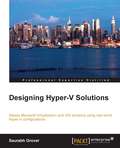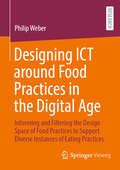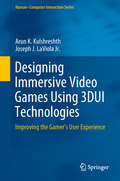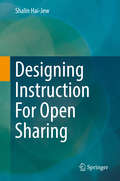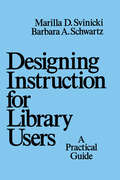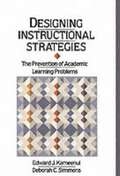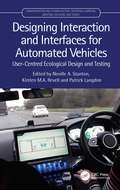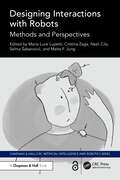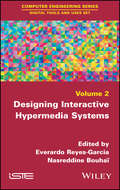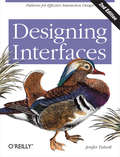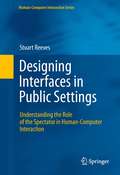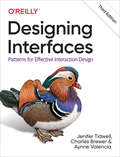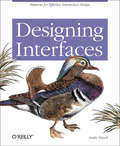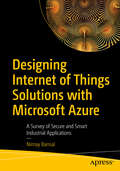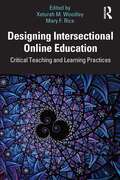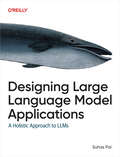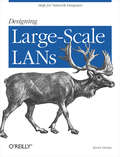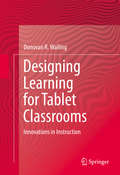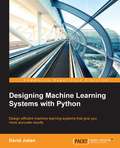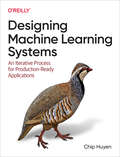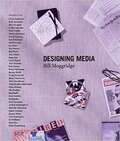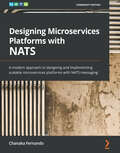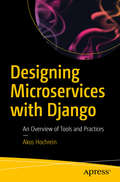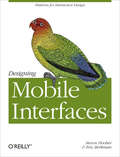- Table View
- List View
Designing Hyper-V Solutions
by Saurabh GroverThis book is aimed at IT admins, consultants, and architects alike who wish to deploy, manage, and maintain Hyper-V solutions in organizations of various sizes. You are expected to have a working knowledge of managing Windows Server and a fair understanding of networking and storage concepts.
Designing ICT around Food Practices in the Digital Age: Informing and Filtering the Design Space of Food Practices to Support Diverse Instances of Eating Practices
by Philip WeberHuman-Food Interaction (HFI), a subfield of Human-Computer Interaction (HCI), examines how technology shapes food practices, from shopping and cooking to eating and disposal. This book focuses on eating, particularly dining out, and explores the role of technology in these practices.Methodologically, it maps the design space by studying eating habits before, during, and after meals, the impact of COVID-19, and food influencers&’ digital work. Observational studies, interviews, and social media analyses provide a rich foundation for understanding these dynamics.Additionally, the book refines the design space through prototyping and evaluating three ICT artifacts, using participatory design and user studies. Findings offer insights into tailoring technology for diverse eating contexts, contributing to more context-aware and supportive food-related technologies.
Designing Immersive Video Games Using 3DUI Technologies: Improving The Gamer's User Experience (Human–Computer Interaction Series)
by Arun K. Kulshreshth Joseph J. LaViola Jr.A 3D user interface (3DUI) is an interface in which the user performs tasks in three dimensions. For example, interactions using hand/body gestures, interaction using a motion controller (e.g. Sony PlayStation Move), interaction with virtual reality devices using tracked motion controllers, etc. All these technologies which let a user interact in three dimensions are called 3D user interface technologies.These 3D user interfaces have the potential to make games more immersive & engaging and thus potentially provide a better user experience to gamers. Although 3D user interface technologies are available for games, it is unclear how their usage affects game play and if there are any user performance benefits. This book presents state of the art research on exploring 3D user interface technologies for improving video games. It also presents a review of research work done in this area and describes experiments focused on usage of stereoscopic 3D, head tracking, and hand gesture-based control in gaming scenarios. These experiments are systematic studies in gaming environments and are aimed at understanding the effect of the underlined 3D interface technology on the gaming experience of a user. Based on these experiments, several design guidelines are presented which can aid game designers in designing better immersive games.
Designing Instruction For Open Sharing
by Shalin Hai-JewThis textbook considers and addresses the design of online learning objects, electronic textbooks, short courses, long courses, MOOC courses, and other types of contents for open sharing. It also considers the design of online mediated communities to enhance such learning. The “openness” may be open-access, and/or it may even be open-source. The learning may range from self-directed and automated to AI robot-led to instructor-led. The main concept of this work is that design learning for open sharing, requires different considerations than when designing for closed and proprietary contexts. Open sharing of learning contents requires a different sense of laws (intellectual property, learner privacy, pedagogical strategies, technologies, media, and others). It requires different considerations of learner diversity and inclusion. It requires geographical, cultural, and linguistic considerations that are not as present in more localized designs. The open sharing aspect also has effects on learner performance tracking (assessments) and learner feedback. This textbook targets students, both undergraduate and graduate in computer science, education and other related fields. Also, professionals in this field managing online systems would find this book helpful.
Designing Instruction for Library Users: A Practical Guide
by Marilla SvinickiThis book discusses the principles of learning theory and instructional design, and provides the reader with the theoretical framework needed for design decision-making. It is helpful for the academic librarian who has responsibility for teaching students library skills.
Designing Instructional Strategies: The Prevention of Academic Learnig Problem
by Edward J. Kameenui Deborah C. SimmonsDesigning Instructional Strategies: The Prevention of Academic Learning Problems is about designing and delivering instruction to students with academic learning problems. These students are identified as learning disabled, mildly handicapped, or emotionally disturbed who receive services in special education or general education settings.
Designing Interaction and Interfaces for Automated Vehicles: User-Centred Ecological Design and Testing (Transportation Human Factors)
by Patrick Langdon Neville A. Stanton Kirsten M. A. RevellDriving automation and autonomy are already upon us and the problems that were predicted twenty years ago are beginning to appear. These problems include shortfalls in expected benefits, equipment unreliability, driver skill fade, and error-inducing equipment designs. Designing Interaction and Interfaces for Automated Vehicles: User-Centred Ecological Design and Testing investigates the difficult problem of how to interface drivers with automated vehicles by offering an inclusive, human-centred design process that focusses on human variability and capability in interaction with interfaces. This book introduces a novel method that combines both systems thinking and inclusive user-centred design. It models driver interaction, provides design specifications, concept designs, and the results of studies in simulators on the test track, and in road going vehicles. This book is for designers of systems interfaces, interactions, UX, Human Factors and Ergonomics researchers and practitioners involved with systems engineering and automotive academics._ "In this book, Prof Stanton and colleagues show how Human Factors methods can be applied to the tricky problem of interfacing human drivers with vehicle automation. They have developed an approach to designing the human-automation interaction for the handovers between the driver and the vehicle. This approach has been tested in driving simulators and, most interestingly, in real vehicles on British motorways. The approach, called User-Centred Ecological Interface Design, has been validated against driver behaviour and used to support their ongoing work on vehicle automation. I highly recommend this book for anyone interested, or involved, in designing human-automation interaction in vehicles and beyond." Professor Michael A. Regan, University of NSW Sydney, AUSTRALIA
Designing Interactions with Robots: Methods and Perspectives (Chapman & Hall/CRC Artificial Intelligence and Robotics Series)
by Maria Luce Lupetti Cristina Zaga Nazli Cila Selma Šabanović Malte F. JungDeveloping robots to interact with humans is a complex interdisciplinary effort. While engineering and social science perspectives on designing human–robot interactions (HRI) are readily available, the body of knowledge and practices related to design, specifically interaction design, often remain tacit. Designing Interactions with Robots fills an important resource gap in the HRI community, and acts as a guide to navigating design-specific methods, tools, and techniques.With contributions from the field's leading experts and rising pioneers, this collection presents state of the art knowledge and a range of design methods, tools, and techniques, which cover the various phases of an HRI project. This book is accessible to an interdisciplinary audience, and does not assume any design knowledge. It provides actionable resources whose efficacy have been tested and proven in existing research.This manual is essential for HRI design students, researchers, and practitioners alike. It offers crucial guidance for the processes involved in robot and HRI design, marking a significant stride toward advancing the HRI landscape.The Open Access version of this book, available at http://www.taylorfrancis.com, has been made available under a Creative Commons Attribution-Non Commercial-No Derivatives (CC-BY-NC-ND) 4.0 license.
Designing Interactive Hypermedia Systems
by Everardo Reyes-Garcia Nasreddine BouhaïThe design and development of hypermedia systems is a complex process. It demands to take into account: the types of information, supported media, distributing/using environments, type of end-users, kinds of tasks, social contexts, practices and usages it modifies. This book aims at exploring and illustrating the different ways in which hypermedia systems and tools are designed according to those aspects. The design and visualization schemes included in any system will be related to the variety of social and technical complexities confronted by researchers in social, communication, humanities, art and design.
Designing Interfaces
by Jenifer TidwellThis idea book describes 94 user interface design components for both desktop and web applications. Separate chapters address content structure, navigation, page layout, actions and commands, information graphics, and data collection forms. Most of the patterns receive a two-page layout that explains when, how, and why to use the technique and provides example screenshots in color. Annotation ©2006 Book News, Inc. , Portland, OR (booknews. com)
Designing Interfaces
by Jenifer TidwellDespite all of the UI toolkits available today, it's still not easy to design good application interfaces. This bestselling book is one of the few reliable sources to help you navigate through the maze of design options. By capturing UI best practices and reusable ideas as design patterns, Designing Interfaces provides solutions to common design problems that you can tailor to the situation at hand. This updated edition includes patterns for mobile apps and social media, as well as web applications and desktop software. Each pattern contains full-color examples and practical design advice that you can use immediately. Experienced designers can use this guide as a sourcebook of ideas; novices will find a roadmap to the world of interface and interaction design. Design engaging and usable interfaces with more confidence and less guesswork Learn design concepts that are often misunderstood, such as affordances, visual hierarchy, navigational distance, and the use of color Get recommendations for specific UI patterns, including alternatives and warnings on when not to use them Mix and recombine UI ideas as you see fit Polish the look and feel of your interfaces with graphic design principles and patterns "Anyone who's serious about designing interfaces should have this book on their shelf for reference. It's the most comprehensive cross-platform examination of common interface patterns anywhere." --Dan Saffer, author of Designing Gestural Interfaces (O'Reilly) and Designing for Interaction (New Riders)
Designing Interfaces in Public Settings
by Stuart ReevesInteraction with computers is becoming an increasingly ubiquitous and public affair. With more and more interactive digital systems being deployed in places such as museums, city streets and performance venues, understanding how to design for them is becoming ever more pertinent. Crafting interactions for these public settings raises a host of new challenges for human-computer interaction, widening the focus of design from concern about an individual's dialogue with an interface to also consider the ways in which interaction affects and is affected by spectators and bystanders. Designing Interfaces in Public Settings takes a performative perspective on interaction, exploring a series of empirical studies of technology at work in public performance environments. From interactive storytelling to mobile devices on city streets, from digital telemetry systems on fairground rides to augmented reality installation interactive, the book documents the design issues emerging from the changing role of technology as it pushes out into our everyday lives. Building a design framework from these studies and the growing body of literature examining public technologies, this book provides a new perspective for understanding human-computer interaction. Mapping out this new and challenging design space, Designing Interfaces in Public Settings offers both conceptual understandings and practical strategies for interaction design practitioners, artists working with technology, and computer scientists.
Designing Interfaces: Patterns for Effective Interaction Design
by Jenifer Tidwell Charles Brewer Aynne ValenciaDesigning good application interfaces isn’t easy now that companies need to create compelling, seamless user experiences across an exploding number of channels, screens, and contexts. In this updated third edition, you’ll learn how to navigate through the maze of design options. By capturing UI best practices as design patterns, this best-selling book provides solutions to common design problems.You’ll learn patterns for mobile apps, web applications, and desktop software. Each pattern contains full-color examples and practical design advice you can apply immediately. Experienced designers can use this guide as an idea sourcebook, and novices will find a road map to the world of interface and interaction design.Understand your users before you start designingBuild your software’s structure so it makes sense to usersDesign components to help users complete tasks on any deviceLearn how to promote wayfinding in your softwarePlace elements to guide users to information and functionsLearn how visual design can make or break product usabilityDisplay complex data with artful visualizations
Designing Interfaces: Patterns for Effective Interaction Design
by Jenifer TidwellDesigning a good interface isn't easy. Users demand software that is well-behaved, good-looking, and easy to use. Your clients or managers demand originality and a short time to market. Your UI technology -- web applications, desktop software, even mobile devices -- may give you the tools you need, but little guidance on how to use them well.UI designers over the years have refined the art of interface design, evolving many best practices and reusable ideas. If you learn these, and understand why the best user interfaces work so well, you too can design engaging and usable interfaces with less guesswork and more confidence.Designing Interfaces captures those best practices as design patterns -- solutions to common design problems, tailored to the situation at hand. Each pattern contains practical advice that you can put to use immediately, plus a variety of examples illustrated in full color. You'll get recommendations, design alternatives, and warningson when not to use them.Each chapter's introduction describes key design concepts that are often misunderstood, such as affordances, visual hierarchy, navigational distance, and the use of color. These give you a deeper understanding of why the patterns work, and how to apply them with more insight.A book can't design an interface for you -- no foolproof design process is given here -- but Designing Interfaces does give you concrete ideas that you can mix and recombine as you see fit. Experienced designers can use it as a sourcebook of ideas. Novice designers will find a roadmap to the world of interface and interaction design, with enough guidance to start using these patterns immediately.
Designing Internet of Things Solutions with Microsoft Azure: A Survey of Secure and Smart Industrial Applications
by Nirnay BansalBuild a strong and efficient IoT solution at industrial and enterprise level by mastering industrial IoT using Microsoft Azure. This book focuses on the development of the industrial Internet of Things (IIoT) paradigm, discussing various architectures, as well as providing nine case studies employing IoT in common industrial domains including medical, supply chain, finance, and smart homes. The book starts by giving you an overview of the basic concepts of IoT, after which you will go through the various offerings of the Microsoft Azure IoT platform and its services. Next, you will get hands-on experience of IoT applications in various industries to give you a better picture of industrial solutions and how you should take your industry forward. As you progress through the chapters, you will learn real-time applications in IoT in agriculture, supply chain, financial services, retail, and transportation. Towards the end, you will gain knowledge to identify and analyze IoT security and privacy risks along with a detailed sample project. The book fills an important gap in the learning of IoT and its practical use case in your industry. Therefore, this is a practical guide that helps you discover the technologies and use cases for IIoT. By the end of this book, you will be able to build industrial IoT solution in Microsoft Azure with sensors, stream analytics, and serverless technologies. What You Will Learn Provision, configure, and connect devices with Microsoft Azure IoT hub Stream analytics using structural data and non-structural data such as images Use stream analytics, serverless technology, and IoT SaaS offerings Work with common sensors and IoT devicesWho This Book Is For IoT architects, developers, and stakeholders working with the industrial Internet of Things.
Designing Intersectional Online Education: Critical Teaching and Learning Practices
by Xeturah M. WoodleyDesigning Intersectional Online Education provides expansive yet accessible examples and discussion about the intentional creation of online teaching and learning experiences that critically center identity, social systems, and other important ideas in design and pedagogy. Instructors are increasingly tasked with designing their own online courses, curricula, and activities but lack information to support their attention to the ever-shifting, overlapping contexts and constructs that inform students’ positions within knowledge and schooling. This book infuses today’s technology-enhanced education environments with practices derived from critical race theory, culturally responsive pedagogy, disability studies, feminist/womanist studies, queer theory, and other essential foundations for humanized and socially just education. Faculty, scholars, technologists, and other experts across higher education, K-12, and teacher training offer fresh, robust insights into how actively engaging with intersectionality can inspire designs for online teaching and learning that are inclusive, intergenerational, anti-oppressive, and emancipatory.
Designing Large Language Model Applications
by Suhas PaiLarge language models (LLMs) have proven themselves to be powerful tools for solving a wide range of tasks, and enterprises have taken note. But transitioning from demos and prototypes to full-fledged applications can be difficult. This book helps close that gap, providing the tools, techniques, and playbooks that practitioners need to build useful products that incorporate the power of language models.Experienced ML researcher Suhas Pai offers practical advice on harnessing LLMs for your use cases and dealing with commonly observed failure modes. You’ll take a comprehensive deep dive into the ingredients that make up a language model, explore various techniques for customizing them such as fine-tuning, learn about application paradigms like RAG (retrieval-augmented generation) and agents, and more.Understand how to prepare datasets for training and fine-tuningDevelop an intuition about the Transformer architecture and its variantsAdapt pretrained language models to your own domain and use casesLearn effective techniques for fine-tuning, domain adaptation, and inference optimizationInterface language models with external tools and data and integrate them into an existing software ecosystem
Designing Large Scale Lans: Help for Network Designers
by Kevin DooleyThis unique book offers a vendor-neutral approach for designing large local area networks according to business or organizational needs, rather than from a product perspective. Author and independent network design consultant Kevin Dooley outlines "top-down network design" for building a technological infrastructure to fit your organization's requirements, a process far more effective and cost-efficient than fitting the organization to the parameters of a shrink-wrapped proprietary solution.Dooley argues that the design of a network is largely independent of the products used. Whether you use a Cisco or Juniper router, the same security issues and protocols apply. The questions he addresses in this book are need-specific: Do I use a router or a switch? Should I route between switched areas or switch between routed areas?Designing Large-Scale LANs covers everything from security, bandwidth and scalability to network reliability, which includes backup, redundancy, and points of failure. Specific technologies are analyzed in detail: network topologies, routing and switching strategies, wireless, virtual LANs, firewalls and gateways, security, Internet protocols, bandwidth, and multicast services. The book also discusses proprietary technologies that are ubiquitous, such as Cisco's IOS and Novell's IPX.This complete guide to top-down network design will help you choose the right network solutions. If you're designing large scale networks and need expert advice and guidance, look no further than Designing Large-Scale LANs.
Designing Learning for Tablet Classrooms
by Donovan R. WallingThe versatile, cost-effective technology of the tablet computer has proved to be a good fit with the learning capabilities of today's students. Not surprisingly, in more and more classrooms, the tablet has replaced not only traditional print materials but the desktop computer and the laptop as well. Designing Instruction for Tablet Classrooms makes sense of this transition, clearly showing not just how and why tablet-based learning works, but how it is likely to evolve. Written for the non-technical reader, it balances elegant theoretical background with practical applications suitable to learning environments from kindergarten through college. A wealth of specialized topics ranges from course management and troubleshooting to creating and customizing etextbooks, from tablet use in early and remedial reading to the pros and cons of virtual field trips. And for maximum usefulness, early chapters are organized to spotlight core skills needed to negotiate the new design frontier, including: Framing the learning design approach. Analyzing the learning environment. Designing learning that capitalizes on tablet technology. Developing activities that match learning needs. Implementing the learning design. Conducting evaluations before, during, and after. This is proactive reading befitting a future of exciting developments in educational technology. For researchers and practitioners in this and allied fields, Designing Instruction for Tablet Classrooms offers limitless opportunities to think outside the box.
Designing Machine Learning Systems with Python
by David JulianDesign efficient machine learning systems that give you more accurate results About This Book * Gain an understanding of the machine learning design process * Optimize machine learning systems for improved accuracy * Understand common programming tools and techniques for machine learning * Develop techniques and strategies for dealing with large amounts of data from a variety of sources * Build models to solve unique tasks Who This Book Is For This book is for data scientists, scientists, or just the curious. To get the most out of this book, you will need to know some linear algebra and some Python, and have a basic knowledge of machine learning concepts. What You Will Learn * Gain an understanding of the machine learning design process * Optimize the error function of your machine learning system * Understand the common programming patterns used in machine learning * Discover optimizing techniques that will help you get the most from your data * Find out how to design models uniquely suited to your task In Detail Machine learning is one of the fastest growing trends in modern computing. It has applications in a wide range of fields, including economics, the natural sciences, web development, and business modeling. In order to harness the power of these systems, it is essential that the practitioner develops a solid understanding of the underlying design principles. There are many reasons why machine learning models may not give accurate results. By looking at these systems from a design perspective, we gain a deeper understanding of the underlying algorithms and the optimisational methods that are available. This book will give you a solid foundation in the machine learning design process, and enable you to build customised machine learning models to solve unique problems. You may already know about, or have worked with, some of the off-the-shelf machine learning models for solving common problems such as spam detection or movie classification, but to begin solving more complex problems, it is important to adapt these models to your own specific needs. This book will give you this understanding and more. Style and approach This easy-to-follow, step-by-step guide covers the most important machine learning models and techniques from a design perspective.
Designing Machine Learning Systems: An Iterative Process for Production-Ready Applications
by Chip HuyenMachine learning systems are both complex and unique. Complex because they consist of many different components and involve many different stakeholders. Unique because they're data dependent, with data varying wildly from one use case to the next. In this book, you'll learn a holistic approach to designing ML systems that are reliable, scalable, maintainable, and adaptive to changing environments and business requirements.Author Chip Huyen, co-founder of Claypot AI, considers each design decision--such as how to process and create training data, which features to use, how often to retrain models, and what to monitor--in the context of how it can help your system as a whole achieve its objectives. The iterative framework in this book uses actual case studies backed by ample references.This book will help you tackle scenarios such as:Engineering data and choosing the right metrics to solve a business problemAutomating the process for continually developing, evaluating, deploying, and updating modelsDeveloping a monitoring system to quickly detect and address issues your models might encounter in productionArchitecting an ML platform that serves across use casesDeveloping responsible ML systems
Designing Media
by Bill MoggridgeMainstream media, often known simply as MSM, have not yet disappeared in a digital takeover of the media landscape. But the long-dominant MSM―television, radio, newspapers, magazines, and books―have had to respond to emergent digital media. Newspapers have interactive Web sites; television broadcasts over the Internet; books are published in both electronic and print editions. In Designing Media, design guru Bill Moggridge examines connections and conflicts between old and new media, describing how the MSM have changed and how new patterns of media consumption are emerging. The book features interviews with thirty-seven significant figures in both traditional and new forms of mass communication; interviewees range from the publisher of the New York Times to the founder of Twitter. We learn about innovations in media that rely on contributions from a crowd (or a community), as told by Wikipedia's Jimmy Wales and Craigslist's Craig Newmark; how the band OK Go built a following using YouTube; how real-time connections between dispatchers and couriers inspired Twitter; how a BusinessWeek blog became a quarterly printed supplement to the magazine; and how e-readers have evolved from Rocket eBook to QUE. Ira Glass compares the intimacy of radio to that of the Internet; the producer of PBS's Frontline supports the program's investigative journalism by putting documentation of its findings online; and the developers of Google's Trendalyzer software describe its beginnings as animations that accompanied lectures about social and economic development in rural Africa. At the end of each chapter, Moggridge comments on the implications for designing media. Designing Media is illustrated with hundreds of images, with color throughout. A DVD accompanying the book includes excerpts from all of the interviews, and the material can be browsed at www.designing-media.com. Interviews with: Chris Anderson, Rich Archuleta, Blixa Bargeld, Colin Callender, Fred Deakin, Martin Eberhard, David Fanning, Jane Friedman, Mark Gerzon, Ira Glass, Nat Hunter, Chad Hurley, Joel Hyatt, Alex Juhasz, Jorge Just, Alex MacLean, Bob Mason, Roger McNamee, Jeremy Merle, Craig Newmark, Bruce Nussbaum, Alice Rawsthorn, Anna Rosling Rönnlund, Hans Rosling, Ola Rosling, Paul Saffo, Jesse Scanlon, DJ Spooky, Neil Stevenson, Arthur Sulzberger Jr., Shinichi Takemura, James Truman, Jimmy Wales, Tim Westergren, Ev Williams, Erin Zhu, Mark Zuckerberg
Designing Microservices Platforms with NATS: A modern approach to designing and implementing scalable microservices platforms with NATS messaging
by Chanaka FernandoA complete reference for designing and building scalable microservices platforms with NATS messaging technology for inter-service communication with security and observabilityKey FeaturesUnderstand the use of a messaging backbone for inter-service communication in microservices architectureDesign and build a real-world microservices platform with NATS as the messaging backbone using the Go programming languageExplore security, observability, and best practices for building a microservices platform with NATSBook DescriptionBuilding a scalable microservices platform that caters to business demands is critical to the success of that platform. In a microservices architecture, inter-service communication becomes a bottleneck when the platform scales. This book provides a reference architecture along with a practical example of how to implement it for building microservices-based platforms with NATS as the messaging backbone for inter-service communication.In Designing Microservices Platforms with NATS, you'll learn how to build a scalable and manageable microservices platform with NATS. The book starts by introducing concepts relating to microservices architecture, inter-service communication, messaging backbones, and the basics of NATS messaging. You'll be introduced to a reference architecture that uses these concepts to build a scalable microservices platform and guided through its implementation. Later, the book touches on important aspects of platform securing and monitoring with the help of the reference implementation. Finally, the book concludes with a chapter on best practices to follow when integrating with existing platforms and the future direction of microservices architecture and NATS messaging as a whole.By the end of this microservices book, you'll have developed the skills to design and implement microservices platforms with NATS.What you will learnUnderstand the concepts of microservices architectureGet to grips with NATS messaging technologyHandle transactions and message delivery guarantees with microservicesImplement a reference architecture for microservices using NATSDiscover how to improve the platform's security and observabilityExplore how a NATS microservices platform integrates with an enterprise ecosystemWho this book is forThis book is for enterprise software architects and developers who want to gain hands-on microservices experience for designing, implementing, and managing complex distributed systems with microservices architecture concepts. Intermediate-level experience in any programming language and software architecture is required to make the most of this book.
Designing Microservices with Django: An Overview of Tools and Practices
by Akos HochreinExplore microservices using the Python-based Django framework and review the benefits and drawbacks of them. This book will examine what microservices look like, how they talk to each other, and how they are crafted using the Python programming language and the Django web framework.You’ll start by understanding what the key differences are between microservices and monolithic architectures. The book then does a deep dive into how microservices are built and what common models have emerged in our industry. You’ll also take an extensive look at communication and ownership patterns and examine methodologies to speed up your architecture evolution by writing less but more distributed code using the Python programming language and the Django web framework. By the end of the book, you’ll have a solid understanding of microservices architectures. Armed with a comprehensive and solid toolset, you can begin working toward systems that are more scalable, resilient, and maintainable. What You’ll LearnUnderstand the benefits and drawbacks of adopting microservicesDesign systems and architecture for resiliency and distributed ownershipWork with tools for scaling distributed system both in technical and organizational dimensionsExamine the essentials of the Django web framework
Designing Mobile Interfaces: Patterns for Interaction Design
by Steven Hoober Eric BerkmanWith hundreds of thousands of mobile applications available today, your app has to capture users immediately. This book provides practical techniques to help you catch—and keep—their attention. You’ll learn core principles for designing effective user interfaces, along with a set of common patterns for interaction design on all types of mobile devices.Mobile design specialists Steven Hoober and Eric Berkman have collected and researched 76 best practices for everything from composing pages and displaying information to the use of screens, lights, and sensors. Each pattern includes a discussion of the design problem and solution, along with variations, interaction and presentation details, and antipatterns.Compose pages so that information is easy to locate and manipulateProvide labels and visual cues appropriate for your app’s usersUse information control widgets to help users quickly access detailsTake advantage of gestures and other sensorsApply specialized methods to prevent errors and the loss of user-entered dataEnable users to easily make selections, enter text, and manipulate controlsUse screens, lights, haptics, and sounds to communicate your message and increase user satisfaction"Designing Mobile Interfaces is another stellar addition to O’Reilly’s essential interface books. Every mobile designer will want to have this thorough book on their shelf for reference."—Dan Saffer, Author of Designing Gestural Interfaces
